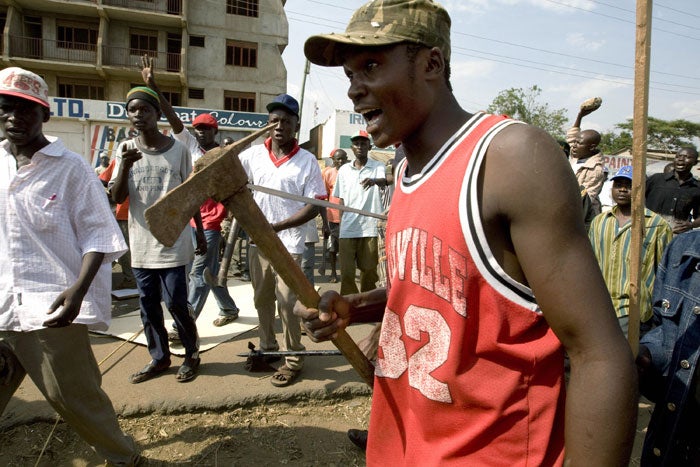Rift Valley mayhem follows murder of opposition politician

Your support helps us to tell the story
From reproductive rights to climate change to Big Tech, The Independent is on the ground when the story is developing. Whether it's investigating the financials of Elon Musk's pro-Trump PAC or producing our latest documentary, 'The A Word', which shines a light on the American women fighting for reproductive rights, we know how important it is to parse out the facts from the messaging.
At such a critical moment in US history, we need reporters on the ground. Your donation allows us to keep sending journalists to speak to both sides of the story.
The Independent is trusted by Americans across the entire political spectrum. And unlike many other quality news outlets, we choose not to lock Americans out of our reporting and analysis with paywalls. We believe quality journalism should be available to everyone, paid for by those who can afford it.
Your support makes all the difference.It was a day that started promisingly. Kofi Annan had led the first full session of negotiations between Kenya's feuding government and opposition. The atmosphere was described as "serious" and the six negotiators had started to make some headway. But by nightfall, violence had broken out once again in towns and cities across the country. The trigger: the killing of an opposition politician, the second in three days.
David Too, a member of parliament for the opposition Orange Democratic Movement (ODM), was shot dead by a police officer along with a female companion, Eunice Chepkwong, as he was driving towards Eldoret in western Kenya.
Local police insisted the shooting was nothing to do with politics and everything to do with passion. "It was a love triangle," said Muinde Kioko, Eldoret's police chief. "Both the MP and the assailant were with the same woman." He said the officer had been arrested and would appear in court today.
But, coming after the murder of a Nairobi parliamentarian, yesterday's killing was quickly denounced as a political act by the ODM leader, Raila Odinga. "I condemn this second execution of an ODM member of parliament," he said. "The purpose of this killing is to reduce the ODM majority."
Whatever the true motive, the murder triggered renewed mayhem in Eldoret, a town that has suffered some of the worst of the violence that has gripped Kwenya since December's flawed election, and brought Mr Annan's negotiations screeching to a halt.
Gangs of young men roamed the streets and threw up roadblocks. Thousands of people sought sanctuary at the police station and hundreds of others fled. Hospital staff said at least 14 people had been shot.
At the town's main hospital, one man, shot by police earlier in the day, was trying to get himself discharged so he could return to what he called his "area of operations".
Aaron Kipkirui, 20, had been setting up a roadblock when police opened fire. "I think I can walk," he said, getting out of bed and jogging on the spot. "I want to go back to the barricades." He said there were about 500 Kalenjin men in his group, but did not say how, or by whom, they were organised. He warned that his militia would seek revenge against the tribe from which the police officer came. "There was no love triangle," he said. "It was pre-planned. The man who did this was a Kisii – we are going to burn the Kisiis' houses. We don't want those guys around us."
Since the election result was announced at the end of December, more than 100,000 people have been driven out of the Rift Valley. Armed gangs, mainly from the Kalenjin tribe, have attacked the homes of Kikuyus, the tribe of President Mwai Kibaki. Members of the Kisii tribe are also seen as supporters of Mr Kibaki.
The deteriorating situation in Kenya dominated the start of the African Union summit in Ethiopia, with the continent's leaders worrying that Kenya's transformation from one of the most stable and democratic countries to one of the most turbulent could affect the image of Africa as a whole. Just five states have so far formally congratulated Mr Kibaki on his re-election. The chairman of the AU commission, Alpha Oumar Konare, urged the leaders not to "sit with hands folded". "If Kenya burns, what is left?" he asked.
Ban Ki-moon, the UN secretary general, will visit Nairobi today to give fresh impetus to the talks led by his predecessor, Mr Annan.
Join our commenting forum
Join thought-provoking conversations, follow other Independent readers and see their replies
Comments